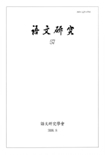- 영문명
- The Anaylsis of Dangie in Ongam-ri Gwangcheon-eup Hongseong-gun
- 발행기관
- 어문연구학회
- 저자명
- 박종익(Jong-ik Park)
- 간행물 정보
- 『어문연구』語文硏究 第57輯, 163~185쪽, 전체 23쪽
- 주제분류
- 어문학 > 한국어와문학
- 파일형태
- 발행일자
- 2008.08.01

국문 초록
영문 초록
Ongam-ri in Gwangcheon-eup Hongseong-gun was a port and a fishing village in the past. It was a quite big port village, where about 100 boats anchored. This village, therefore, had performed Dangje for a good haul of fish, safety on the sea and prosperity.
Ongam-ri as well as Gwangsheon was the trading center of local products. The inland products as well as fishery products from neighboring islands are gathered and traded here. The fishery products are aggregated here from islands and fishing villages and distributed to Seoul. The agricultural products from inland areas were sold to the islands and fishing villages from this village.
As the port in Ongam-ri developed, Dangje ofthe village also became bigger and flourishing. In the post-war days, a cow was offered as a sacrifice and they conducted a ceremony for a week. The ship-owners at the village or at anchor all participated in the Dange and made some donation.
In the past, the Dangje at Ongam-ri was performed for the gods of grandparents and mountain spirit at Ongam Youngsan-dang first, and it was continued to the street ritual at Dangsan-shinmok. This ritual ceremony were continued from the afternoon until dawn. Then in 1980’s, the way Dangje was processed was different. After reading a sutra and having a ritual ceremony at Dangsan-shinmok first, people came back to Ongam Youngsan-dang to worship for the god of grandparents, mountain sprits and the general of gods (ObangDeajangGun).
The gods of grandparents at main temple of Ongam-ri Dangje are the main gods of Ongam-ri village. These gods are sea gods which are identical and equivalent to the gods of neighboring fishing villages or island villages because Ongam-ri was a port and fishing village at that time where Dangje had performed. The gods of grandparents at Ongam-ri were sea gods and dragon gods in that the village people pursed a good haul of fish.
Ongam-ri as well as Gwangsheon was the trading center of local products. The inland products as well as fishery products from neighboring islands are gathered and traded here. The fishery products are aggregated here from islands and fishing villages and distributed to Seoul. The agricultural products from inland areas were sold to the islands and fishing villages from this village.
As the port in Ongam-ri developed, Dangje ofthe village also became bigger and flourishing. In the post-war days, a cow was offered as a sacrifice and they conducted a ceremony for a week. The ship-owners at the village or at anchor all participated in the Dange and made some donation.
In the past, the Dangje at Ongam-ri was performed for the gods of grandparents and mountain spirit at Ongam Youngsan-dang first, and it was continued to the street ritual at Dangsan-shinmok. This ritual ceremony were continued from the afternoon until dawn. Then in 1980’s, the way Dangje was processed was different. After reading a sutra and having a ritual ceremony at Dangsan-shinmok first, people came back to Ongam Youngsan-dang to worship for the god of grandparents, mountain sprits and the general of gods (ObangDeajangGun).
The gods of grandparents at main temple of Ongam-ri Dangje are the main gods of Ongam-ri village. These gods are sea gods which are identical and equivalent to the gods of neighboring fishing villages or island villages because Ongam-ri was a port and fishing village at that time where Dangje had performed. The gods of grandparents at Ongam-ri were sea gods and dragon gods in that the village people pursed a good haul of fish.
목차
1. 서론
2. 마을의 입지와 성쇠
3. 당제의 전개와 제의구조
4. 당신(堂神)의 성격과 의미
5. 결론
참고문헌
Abstract
2. 마을의 입지와 성쇠
3. 당제의 전개와 제의구조
4. 당신(堂神)의 성격과 의미
5. 결론
참고문헌
Abstract
키워드
해당간행물 수록 논문
참고문헌
최근 이용한 논문
교보eBook 첫 방문을 환영 합니다!

신규가입 혜택 지급이 완료 되었습니다.
바로 사용 가능한 교보e캐시 1,000원 (유효기간 7일)
지금 바로 교보eBook의 다양한 콘텐츠를 이용해 보세요!



